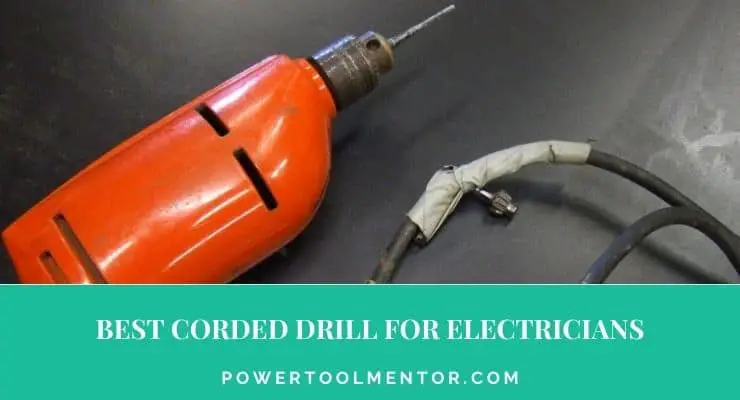A drill makes an essential part of an electrician’s toolkit. A corded drill is by far more important to an electrician than a corded one due to its power and weight. Corded drills have been around for a long time with improvements being made over time. Since they don’t use batteries, you don’t need to recharge or replace them making them better than corded drills. They’re lightweight and have the power needed for any tasks since they use direct power from the source. Corded drills can also be used for other tasks like running wire brushes, drilling, mixing paint, and many more and have the torque & power to handle a wide range of materials like wood, metal, and masonry.
Best Corded Drill for Electricians – A Comparison Table
| Image | Model | Best For | Check on Amazon |
|---|---|---|---|
 | DEWALT DWD115K Corded Drill | Best overall corded drill for electricians | Check On Amazon |
 | Makita 6302H Electric Drill | Most ideal for heavy-duty | Check On Amazon |
 | Makita DA3010F Right Angle Drill | Best right-angle drill | Check On Amazon |
 | BLACK+DECKER DR260C Corded Drill | Value for money | Check On Amazon |
 | DEWALT DWE1014 Corded Drill | Most lightweight | Check On Amazon |
1 – DEWALT DWD115K Corded Drill – Best overall corded drill for electricians
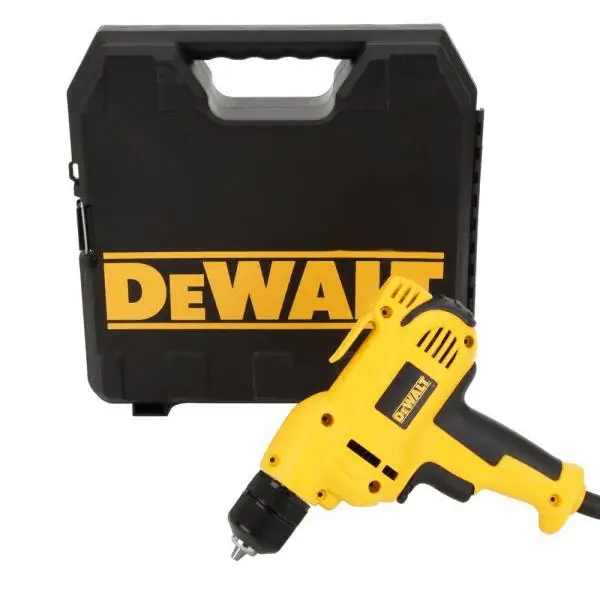
The Dewalt DWD115K ticks off all the boxes for the right corded drill that an electrician can ever wish for. It’s powerful enough to deliver on the most of its applications including heavy-duty ones using a powerful 8 Amp motor. For a beginner, it’s very easy to use with its mid-handle grip design and soft grip that provides comfort and balance. It also has a VSR (variable speed trigger) trigger that allows you to choose the speed level of up to 2500 RPM which offers you versatility when drilling or fastening applications. This drill uses a ⅜ -inch metallic keyless chuck for holding the drill bits in place and is meant to last with its durable design.
Pros
- Easy to set up and use
- The construction is sturdy and is made out of fine material
- It’s powerful
- It lightweight, compact, and well-balanced
- The trigger is easy to control
Cons
- The chuck may not lock completely and the drill bits might keep slipping due to pressure
View price on Amazon
2 – Makita 6302H Electric Drill – Most ideal for heavy-duty
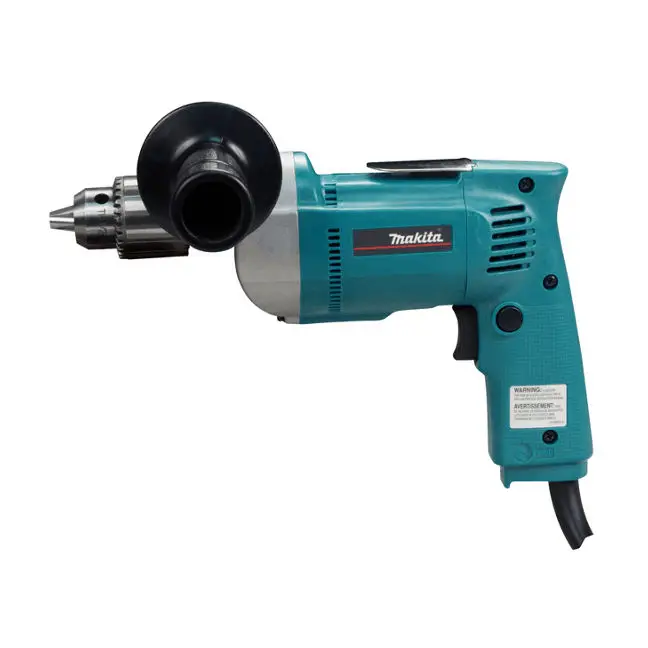
The Makita 6302H has a sturdy design with an impressive powerful 6.5 Amp motor to provide you with enough power to continuously work on heavy-duty areas. It has a variable speed of 550 RPM controlled using a variable reverse trigger that offers you versatility and precision that you can adjust the speed according to the work at hand. The trigger also has a button that locks to prevent accidental reverse toggling. Besides, it comes with side handles that you can attach for more control and convenience when handling the drill. You can use this drill for heavy-duty takes over a long time without being fatigued since it only weighs 4.8 pounds and is compact.
Pros
- It has an ergonomic design that minimizes fatigue
- It’s easy to use
- It has a sturdy construction
- It’s durable
Cons
- The reverse switch is located at the bottom of the handle
- It’s not ideal for lefties
View price on Amazon
3 – Makita DA3010F Right Angle Drill – Best right-angle drill
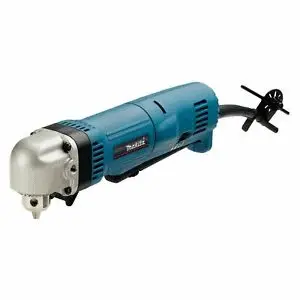
Every electrician knows the pain of having to work in tight spaces that a standard drill can’t reach. A right-angle drill like the Makita DA3010F drill meets your requirements while corded. It has a powerful 4 Amp motor and a variable speed of up to 2400 RPM that can drill through wood or metal and fasten fast. It’s compact and lightweight to fit in those tight spaces like between framing studs. Since you’ll be working tight dark spaces, it provides you with the lighting you need using an inbuilt LED light and comes with a side grip handle that offers you better leverage when installed.
Pros
- The construction is sturdy
- It’s worth the money
- Lightweight and compact to fit in tight spaces
Cons
● Drill bits may keep slipping
● The speed control is may not be as steady
View price on Amazon
4 – BLACK+DECKER Corded Drill, 5.5-Amp, 3/8-Inch (DR260C) – Value for money
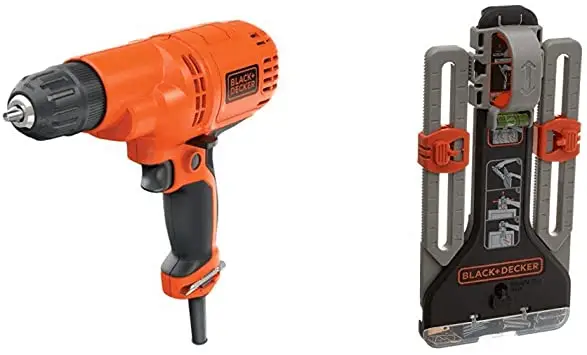
If you’re looking to save some money and still get a drill that offers the same level of performance, then look no further. BLACK+DECKER DR260C Corded Drill meets these requirements with its low pricing point but powerful performance. It’s powerful and compact with a weight of slightly above 3 pounds. It has a variable speed of up to 1500 RPM for drilling and driving into most materials and spots a variable speed control. With handle grips made from soft high-quality plastic, this power tool offers you the comfort you need when working, preventing any fatigue. It has a forward & reverse slider, as well as a lock-on button that can be easily activated using a single hand, also includes a ⅜ – inch chuck, and a double-ended screwdriving bit.
Pros
- It’s lightweight and allows you to maneuver
- It’s cheap and affordable
- It has an ergonomic design that minimizes fatigue to your hands, wrist, and arms
Cons
- The bit holder is not easy to tighten
View price on Amazon
5 – DEWALT DWE1014 Corded Drill – The most lightweight
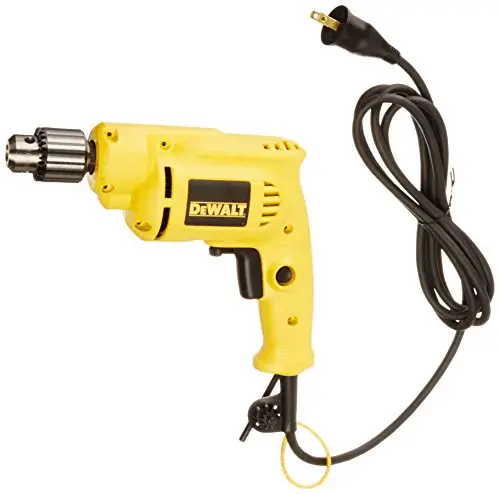
This is another model from Dewalt listed in this article and its greatest selling point is its compactness and paltry weight of 1.77 pounds making it very lightweight. It uses a powerful 7 Amp motor to power its wide range of speed ranging from 0 to 28000 RPM depending on your material and can be adjusted easily using a speed trigger. It has a variable speed reverse and uses a chuck size of ⅜ inches to hold the drill bits securely in place using a key. For bit retention, it uses ⅛ inch for wooden materials while the ⅜ inch chuck is for steel and you also get a 3-year warranty.
Pros
- It’s highly durable and comes with a powerful motor
- It has a compact design and is lightweight
- It comes with a variable trigger for speed
- It also has a lock-on switch to prevent toggling
- The long cord making mobility much easier
- It has an ergonomic design to reduce fatigue
Cons
- Its relatively pricey
- It uses a high current
View price on Amazon
What to Look at When Buying the Best Corded Drill for Electricians
-
Speed and power
Speed and power go together and are the most crucial features to look for in a drill because they to a larger extent determine its performance. Speed is measured in RPM (revolutions per seconds) with an average model having about 1000 RPM. However, most models come with multiple speed settings that allow you to toggle between different speed levels with the least being 400 to 600 RPM while the higher ones tend to be between 1400 to 1700 RPM. As for power, it’s measured in amperage (Amps) and it determines the strength of your drill’s motor. An average corded drill will have around 8 Amps, but the more the Amps the better the motor.
-
Variable speeds
Manufacturers have made major improvements on power tools with many drills coming with different speed settings which are key when buying a drill. A single-speed drill has a speed of about 750 to 1000 RPM which is good for only drilling holes. However, for an experienced electrician, you need a tool that provides you with versatility. A drill with at least 2 different speed settings will guarantee you the versatility and speed to take on a wide variety of applications. Variable speed settings allow you to achieve more versatility.
-
Drill bits
Drill bits and the chuck size work in combination with the chuck being the part of a drill where you insert the drill bits into. They exist in 3 main sizes – ¼, ⅜, and ½ inches which represents the chuck diameter that holds the drill bits in place. A ¼ – inch bit is the smallest and is primarily designed for tasks that require less power. ⅜ – inch drill bits are the standard sizes for most drills for home use and other tasks while the ½ inch drill is for heavy-duty applications. Therefore, harder materials will need larger bits while smaller materials will require smaller bits. Lastly, it’s worth noting that different drill bits will require different torque, speed, and variations. Chucks come in two types – keyed and keyless. The main difference is that for you to operate a keyed chuck, you need a key, and this makes it more secure by holding the bits firmly compared to a keyless chuck that can be tightened using your own hands which might be cumbersome if you don’t have the muscles.
-
Ergonomics
This is something most tend to overlook and it’s crucial. The comfort that a drill provides you especially when you use it over long sessions will determine how long you work. It’s recommended that you check a drill’s weight and size to help you decide how comfortable it is to use. It has to balance well in your hands without leaving them fatigued. Also, make sure the handle fits perfectly in your hand and what material has been used on the handle & grip. Is it soft and contoured to satisfactorily give you comfort when holding it? This will ensure it doesn’t slip out of hand when using it.
-
Weight
It’s a key consideration to keep in mind when finding balance. Despite corded drills being lighter than corded drills because of lack of batteries, you’ll find that some units are heavier than others. Overall, you want a tool that has the right weight and won’t get you fatigued after a short time while giving you adequate power.
-
Clutch
Clutches are a safety feature on drills that react to resistance to prevent stripping of screws. They also ensure that you don’t drive the screws too deep especially if you’re a newbie. It’s ideal if you use your drill/driver mostly as a screwdriver and you should go for an adjustable drill/driver.
-
Forward/reverse switch
A drill with a forward/reverse switch is more versatile and by far a much better option than one without. This function allows you to remove screws, and with the reverse switch, you should be able to disassemble a cabinet easily. This feature comes with most corded drills/drivers but to be on the safe side, counter check before buying.
-
Cord length
The length of the drill’s cord may not be that important but it plays a role in how the cord will be operated. Depending on your working area, the cord length may be a determinant of your mobility. Since it’ll be plugged into a power outlet, you don’t want it to be too short. Alternatively, you can use an extension cord to extend the length giving you more room for mobility.
-
LED light
This is mostly an additional feature that can be very useful for an electrician if you operate in poorly lit spaces like the basement. It provides you with light to see the surrounding.
Frequently Asked Questions (FAQs)
Can I use a corded drill with an extension cord?
Yes. However, you should get an extension cord with the right amperage to avoid overloading it. Ensure that it has the right amps to handle the drill as well and any additional power tools you might have plugged in.
How do I go about using a corded power drill?
Wear protective goggles to protect your eyes from particles. Begin by plugging the cord into a power outlet like a wall socket or an extension cord if its cord isn’t long enough for your application. Ensure that the extension you’re using has the right amperage for the job. Place the tool on a working surface or bring it closer to the dried area if you’re using it as a driver. For safety purposes, make sure that the drill can be safely turned off. Select the desired speed settings and proceed to switch it on by pressing the power switch. Hold and apply press on the material you want to penetrate and drill a hole or drive into it a screw. Ensure you maintain a firm and constant grip. When done, turn off the drill and place it safely in a clear area, then unplug the cord immediately.
Conclusion
You can now go ahead and yourself that corded drill that you’ve always wanted for electrical tasks. Lets hope that our best corded drill for electricians selection helped you.
